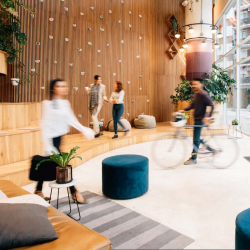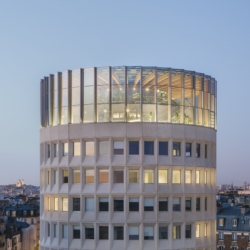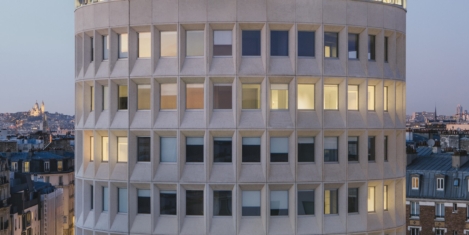December 15, 2025
Search Results for: people management
December 11, 2025
JLL sets out the five key corporate real estate trends for next year
by Neil Franklin • News, Property
 A new analysis from JLL claims to highlight how global occupiers are rethinking corporate real estate as a strategic tool for talent, culture and performance rather than treating it purely as a cost. The report identifies five priorities expected to influence workplace strategy in the year ahead, reflecting continued pressure on portfolios alongside rising expectations for employee experience and sustainability. JLL says organisations are increasingly shifting to more flexible “elastic portfolios” as they look to balance cost control with growth. Office utilisation remains well below target levels, prompting a move away from long, fixed leases in favour of portfolios that can expand or contract according to market conditions, workforce needs or new business opportunities. The firm argues that portfolio management is now closer to a continuous process than a periodic exercise.
A new analysis from JLL claims to highlight how global occupiers are rethinking corporate real estate as a strategic tool for talent, culture and performance rather than treating it purely as a cost. The report identifies five priorities expected to influence workplace strategy in the year ahead, reflecting continued pressure on portfolios alongside rising expectations for employee experience and sustainability. JLL says organisations are increasingly shifting to more flexible “elastic portfolios” as they look to balance cost control with growth. Office utilisation remains well below target levels, prompting a move away from long, fixed leases in favour of portfolios that can expand or contract according to market conditions, workforce needs or new business opportunities. The firm argues that portfolio management is now closer to a continuous process than a periodic exercise.
December 10, 2025
Solar power plants: from panels to the grid
by Neil Franklin • Company news
 More and more people are turning to solar energy as a reliable and sustainable electricity source. Solar power technology is improving, and equipment costs are decreasing every year. This allows more countries and companies to transition to green sources. DTEK Group is the largest private investor in the country’s energy sector, with investments of over €12 billion since 2005 and 55,000 employees. The company harnesses wind, sun, and thermal resources to generate electricity. Thanks to its hard work and innovation, DTEK Group is helping the Ukraine renewable energy scene grow and move towards cleaner, greener power. (more…)
More and more people are turning to solar energy as a reliable and sustainable electricity source. Solar power technology is improving, and equipment costs are decreasing every year. This allows more countries and companies to transition to green sources. DTEK Group is the largest private investor in the country’s energy sector, with investments of over €12 billion since 2005 and 55,000 employees. The company harnesses wind, sun, and thermal resources to generate electricity. Thanks to its hard work and innovation, DTEK Group is helping the Ukraine renewable energy scene grow and move towards cleaner, greener power. (more…)
December 10, 2025
Five strategies to enhance HR efficiency in modern workplaces
by Jesse Yancey • News, Workplace
![]() HR departments are supposed to be the backbone of modern workplaces, but many are struggling to keep up. You’ve probably seen it firsthand: talented HR teams getting bogged down in administrative tasks when they should be driving real organizational change. The problem isn’t lack of effort. It’s that most HR departments are still operating like it’s 2010. Today’s business world moves fast, and your HR processes need to match that pace. (more…)
HR departments are supposed to be the backbone of modern workplaces, but many are struggling to keep up. You’ve probably seen it firsthand: talented HR teams getting bogged down in administrative tasks when they should be driving real organizational change. The problem isn’t lack of effort. It’s that most HR departments are still operating like it’s 2010. Today’s business world moves fast, and your HR processes need to match that pace. (more…)
December 4, 2025
Call for accessible design for laboratories to make sure organisations don’t miss out on talent
by Neil Franklin • News, Workplace design
 The Royal Society of Chemistry has called for urgent changes to the design and culture of laboratory spaces after a new report revealed widespread barriers facing disabled researchers. The organisation warns that the chemical sciences could lose out on major discoveries unless universities, industry and policymakers act to create more inclusive environments. The Disability-Inclusive Laboratories in the Chemical Sciences report draws on contributions from more than 400 chemists and sets out a detailed picture of the physical, cultural and organisational obstacles that shape disabled scientists’ careers. According to the findings, almost a third of disabled chemists have experienced bullying or discrimination linked to disability, while more than a quarter say they do not feel a sense of belonging at work. Three-quarters report a lack of awareness among colleagues about their support needs. (more…)
The Royal Society of Chemistry has called for urgent changes to the design and culture of laboratory spaces after a new report revealed widespread barriers facing disabled researchers. The organisation warns that the chemical sciences could lose out on major discoveries unless universities, industry and policymakers act to create more inclusive environments. The Disability-Inclusive Laboratories in the Chemical Sciences report draws on contributions from more than 400 chemists and sets out a detailed picture of the physical, cultural and organisational obstacles that shape disabled scientists’ careers. According to the findings, almost a third of disabled chemists have experienced bullying or discrimination linked to disability, while more than a quarter say they do not feel a sense of belonging at work. Three-quarters report a lack of awareness among colleagues about their support needs. (more…)
November 28, 2025
The UK’s most influential workplace design event is open for registration
by Freddie Steele • News, Workplace design
 Registration is now officially open for Workspace Design Show London, returning to the Business Design Centre on 25–26 February 2026 with its most forward-thinking edition yet. The 2026 show will push even further under its new theme, Connected Realities, exploring how physical spaces and digital layers are increasingly merging to shape the workplaces of tomorrow. Across two days, the event will transform the BDC into a dynamic landscape of ideas and innovation, featuring leading UK and international brands unveiling the latest in furniture, lighting, acoustics, flooring, sustainability, digital workplace tools and materials for next-generation environments. Visitors can expect a show floor rich with new launches from companies including König + Neurath, Sedus, Kvadrat, Pedrali, Interface, Forbo and more, alongside a wider range of workplace product innovators shaping the future of work. (more…)
Registration is now officially open for Workspace Design Show London, returning to the Business Design Centre on 25–26 February 2026 with its most forward-thinking edition yet. The 2026 show will push even further under its new theme, Connected Realities, exploring how physical spaces and digital layers are increasingly merging to shape the workplaces of tomorrow. Across two days, the event will transform the BDC into a dynamic landscape of ideas and innovation, featuring leading UK and international brands unveiling the latest in furniture, lighting, acoustics, flooring, sustainability, digital workplace tools and materials for next-generation environments. Visitors can expect a show floor rich with new launches from companies including König + Neurath, Sedus, Kvadrat, Pedrali, Interface, Forbo and more, alongside a wider range of workplace product innovators shaping the future of work. (more…)
November 28, 2025
Four built environment projects named the winners of the 2025 ULI Europe Awards for Excellence
by Neil Franklin • News, Property
 This week, four real estate projects were named the overall winners of the 2025 Urban Land Institute (ULI) Europe Awards for Excellence from this year’s ten finalists. The winning projects include a social housing project in Milan situated on an abandoned office development site, a new secondary school in Brussels developed in a former brewery, a new flexible life sciences hub in Stockholm, and an acute healthcare facility in Birmingham which is intended as a catalyst for community regeneration. (more…)
This week, four real estate projects were named the overall winners of the 2025 Urban Land Institute (ULI) Europe Awards for Excellence from this year’s ten finalists. The winning projects include a social housing project in Milan situated on an abandoned office development site, a new secondary school in Brussels developed in a former brewery, a new flexible life sciences hub in Stockholm, and an acute healthcare facility in Birmingham which is intended as a catalyst for community regeneration. (more…)
November 13, 2025
Tony Attard named as new chair for British Furniture Confederation
by Freddie Steele • News, Workplace design
 After ten years in the hot seat, Jonathan Hindle is stepping down as chairman of the British Furniture Confederation (BFC). The new chairman is Tony Attard, OBE, DL, founder and chairman of the Panaz Group. The BFC was set up in 2006 by the Worshipful Company of Furniture Makers Company (WCFM) to be the voice of the industry to government. Since its formation, its chairs have traditionally been Past Masters of the WCFM– Tony was Master in 2022-3 and President of the Furnishing Industry Benevolent Association (FTBA) prior to its merger with the FMC in 2012. (more…)
After ten years in the hot seat, Jonathan Hindle is stepping down as chairman of the British Furniture Confederation (BFC). The new chairman is Tony Attard, OBE, DL, founder and chairman of the Panaz Group. The BFC was set up in 2006 by the Worshipful Company of Furniture Makers Company (WCFM) to be the voice of the industry to government. Since its formation, its chairs have traditionally been Past Masters of the WCFM– Tony was Master in 2022-3 and President of the Furnishing Industry Benevolent Association (FTBA) prior to its merger with the FMC in 2012. (more…)
November 5, 2025
Government report warns of growing health-related economic inactivity
by Neil Franklin • News, Wellbeing
 The Government has published its final Keep Britain Working report, warning that the United Kingdom faces a continuing rise in economic inactivity linked to ill health, disability and long-term sickness. The report, issued by the Department for Work and Pensions and the Department for Business and Trade, sets out evidence that more people are leaving the workforce because of health conditions, reducing productivity and increasing costs for employers and the state. (more…)
The Government has published its final Keep Britain Working report, warning that the United Kingdom faces a continuing rise in economic inactivity linked to ill health, disability and long-term sickness. The report, issued by the Department for Work and Pensions and the Department for Business and Trade, sets out evidence that more people are leaving the workforce because of health conditions, reducing productivity and increasing costs for employers and the state. (more…)
October 29, 2025
The successful implementation of new ideas can come at a cost, says new research
by Neil Franklin • Business, News
 New research from King’s Business School has suggested that too much success can be a problem, at least when it comes to the implementation of new ideas. The study, carried out with colleagues from University of Liverpool Management School, University of Hohenheim and Rotterdam School of Management, Erasmus University and published in the journal Research Policy, suggests that employees who experience exceptionally high levels of success are less likely to see their next ideas implemented. (more…)
New research from King’s Business School has suggested that too much success can be a problem, at least when it comes to the implementation of new ideas. The study, carried out with colleagues from University of Liverpool Management School, University of Hohenheim and Rotterdam School of Management, Erasmus University and published in the journal Research Policy, suggests that employees who experience exceptionally high levels of success are less likely to see their next ideas implemented. (more…)
September 18, 2025
Lead boldly, pivot strategically: redefine change leadership, before it redefines you
by Jennifer Bryan and Louise Robey • Business, Comment, JB
 Change management is no longer just a discipline, it’s a mindset. In today’s hyperconnected, rapidly evolving business landscape, the ability to lead through constant transformation has become the defining characteristic of exceptional leadership, and one that is weighing heavily on all leaders. When leaders claim that “people don’t like change,” they’re missing a fundamental truth about human nature. We navigate change every single day, adapting our morning routines when a loved one falls ill, finding alternative routes when our train is cancelled, or pivoting our plans when circumstances shift. Change itself isn’t the problem. The issue is that people don’t like being changed or having transformation imposed upon them without agency, understanding, or involvement. (more…)
Change management is no longer just a discipline, it’s a mindset. In today’s hyperconnected, rapidly evolving business landscape, the ability to lead through constant transformation has become the defining characteristic of exceptional leadership, and one that is weighing heavily on all leaders. When leaders claim that “people don’t like change,” they’re missing a fundamental truth about human nature. We navigate change every single day, adapting our morning routines when a loved one falls ill, finding alternative routes when our train is cancelled, or pivoting our plans when circumstances shift. Change itself isn’t the problem. The issue is that people don’t like being changed or having transformation imposed upon them without agency, understanding, or involvement. (more…)


























October 9, 2025
Is a smart building worth it? My research says the answer is an unequivocal yes
by Dr Matthew Marson • Comment, Property, Technology